小学英语总复习单词短语句型语法总汇
- 格式:doc
- 大小:135.00 KB
- 文档页数:20
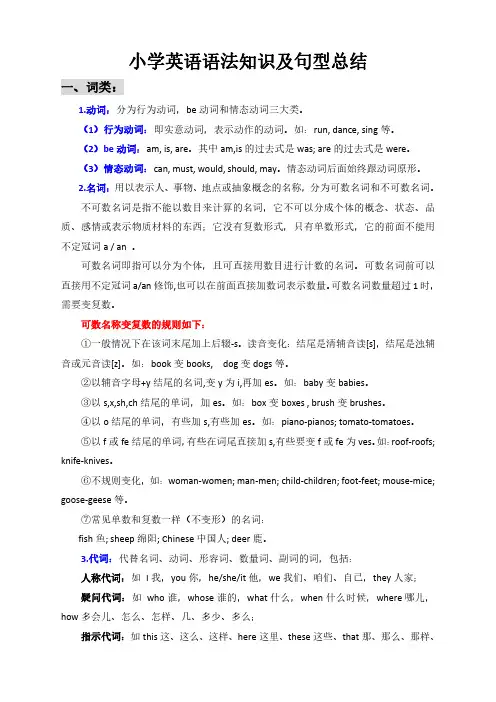
小学英语语法知识及句型总结一、词类:1.动词:分为行为动词,be动词和情态动词三大类。
(1)行为动词:即实意动词,表示动作的动词。
如:run,dance,sing等。
(2)be动词:am,is,are。
其中am,is的过去式是was;are的过去式是were。
(3)情态动词:can,must,would,should,may。
情态动词后面始终跟动词原形。
2.名词:用以表示人、事物、地点或抽象概念的名称,分为可数名词和不可数名词。
不可数名词是指不能以数目来计算的名词,它不可以分成个体的概念、状态、品质、感情或表示物质材料的东西;它没有复数形式,只有单数形式,它的前面不能用不定冠词a/an。
可数名词即指可以分为个体,且可直接用数目进行计数的名词。
可数名词前可以直接用不定冠词a/an修饰,也可以在前面直接加数词表示数量。
可数名词数量超过1时,需要变复数。
可数名称变复数的规则如下:①一般情况下在该词末尾加上后辍-s。
读音变化:结尾是清辅音读[s],结尾是浊辅音或元音读[z]。
如:book变books,dog变dogs等。
②以辅音字母+y结尾的名词,变y为i,再加es。
如:baby变babies。
③以s,x,sh,ch结尾的单词,加es。
如:box变boxes,brush变brushes。
④以o结尾的单词,有些加s,有些加es。
如:piano-pianos;tomato-tomatoes。
⑤以f或fe结尾的单词,有些在词尾直接加s,有些要变f或fe为ves。
如:roof-roofs; knife-knives。
⑥不规则变化,如:woman-women;man-men;child-children;foot-feet;mouse-mice; goose-geese等。
⑦常见单数和复数一样(不变形)的名词:fish鱼;sheep绵阳;Chinese中国人;deer鹿。
3.代词:代替名词、动词、形容词、数量词、副词的词,包括:人称代词:如I我,you你,he/she/it他,we我们、咱们、自己,they人家;疑问代词:如who谁,whose谁的,what什么,when什么时候,where哪儿,how多会儿、怎么、怎样、几、多少、多么;指示代词:如this这、这么、这样、here这里、these这些、that那、那么、那样、there那里、those那些”。
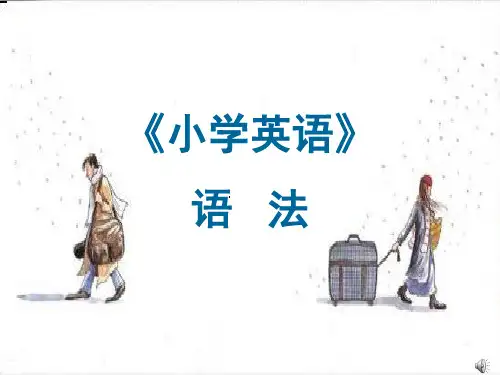
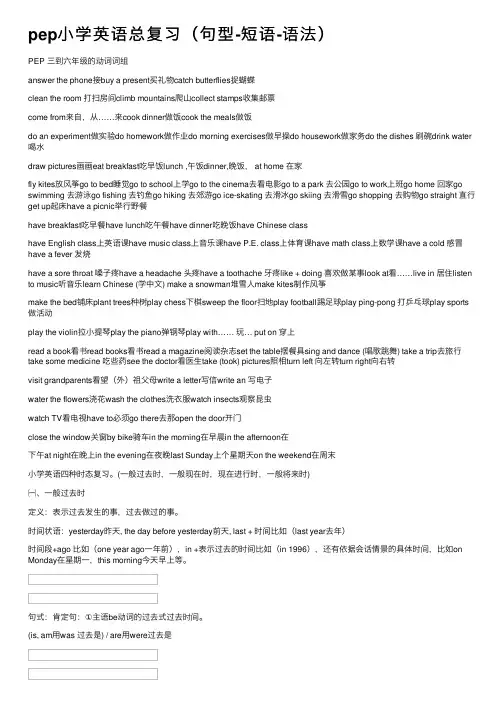
pep⼩学英语总复习(句型-短语-语法)PEP 三到六年级的动词词组answer the phone接buy a present买礼物catch butterflies捉蝴蝶clean the room 打扫房间climb mountains爬⼭collect stamps收集邮票come from来⾃,从……来cook dinner做饭cook the meals做饭do an experiment做实验do homework做作业do morning exercises做早操do housework做家务do the dishes 刷碗drink water 喝⽔draw pictures画画eat breakfast吃早饭lunch ,午饭dinner,晚饭, at home 在家fly kites放风筝go to bed睡觉go to school上学go to the cinema去看电影go to a park 去公园go to work上班go home 回家go swimming 去游泳go fishing 去钓鱼go hiking 去郊游go ice-skating 去滑冰go skiing 去滑雪go shopping 去购物go straight 直⾏get up起床have a picnic举⾏野餐have breakfast吃早餐have lunch吃午餐have dinner吃晚饭have Chinese classhave English class上英语课have music class上⾳乐课have P.E. class上体育课have math class上数学课have a cold 感冒have a fever 发烧have a sore throat 嗓⼦疼have a headache 头疼have a toothache ⽛疼like + doing 喜欢做某事look at看……live in 居住listen to music听⾳乐learn Chinese (学中⽂) make a snowman堆雪⼈make kites制作风筝make the bed铺床plant trees种树play chess下棋sweep the floor扫地play football踢⾜球play ping-pong 打乒乓球play sports 做活动play the violin拉⼩提琴play the piano弹钢琴play with…… 玩… put on 穿上read a book看书read books看书read a magazine阅读杂志set the table摆餐具sing and dance (唱歌跳舞) take a trip去旅⾏take some medicine 吃些药see the doctor看医⽣take (took) pictures照相turn left 向左转turn right向右转visit grandparents看望(外)祖⽗母write a letter写信write an 写电⼦water the flowers浇花wash the clothes洗⾐服watch insects观察昆⾍watch TV看电视have to必须go there去那open the door开门close the window关窗by bike骑车in the morning在早晨in the afternoon在下午at night在晚上in the evening在夜晚last Sunday上个星期天on the weekend在周末⼩学英语四种时态复习。
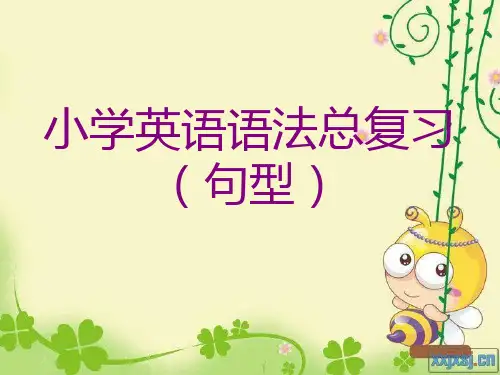
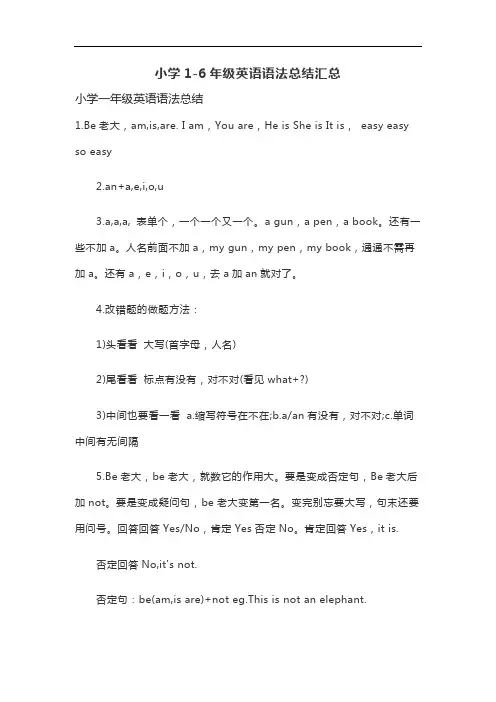
小学1-6年级英语语法总结汇总小学一年级英语语法总结1.Be老大,am,is,are. I am,You are,He is She is It is,easy easy so easy2.an+a,e,i,o,u3.a,a,a, 表单个,一个一个又一个。
a gun,a pen,a book。
还有一些不加a。
人名前面不加a,my gun,my pen,my book,通通不需再加a。
还有a,e,i,o,u,去a加an就对了。
4.改错题的做题方法:1)头看看大写(首字母,人名)2)尾看看标点有没有,对不对(看见what+?)3)中间也要看一看a.缩写符号在不在;b.a/an有没有,对不对;c.单词中间有无间隔5.Be老大,be老大,就数它的作用大。
要是变成否定句,Be老大后加not。
要是变成疑问句,be老大变第一名。
变完别忘要大写,句末还要用问号。
回答回答Yes/No,肯定Yes否定No。
肯定回答Yes,it is.否定回答No,it's not.否定句:be(am,is are)+not eg.This is not an elephant.Is this a monkey?(一般疑问句)Yes,it is. It's a monkey. --------(肯定回答)No,it's not. It's a bear. --------(否定回答)注意哦:I am a girl.变成一般疑问句是Are you a girl?6.反义词,了不起,高矮胖瘦和老幼。
Tall,short,fat,thin,old,young.肯定回答抄原题,否定回答找反义。
Eg.1)Is he tall? Yes,he is.He is tall.2)Is she tall?No,she isn't.She is short.*思考一下:1.Is your mother fat?(否定回答)No,she isn,t.She is thin.2.Is your father short and fat?(否定回答)No,he isn't.He is tall and thin.6.高矮胖瘦年轻老,形容你我刚刚好。
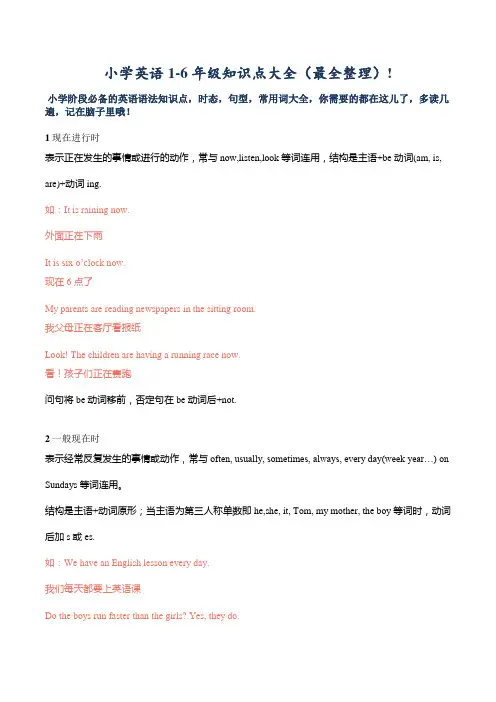
小学英语1-6年级知识点大全(最全整理)!小学阶段必备的英语语法知识点,时态,句型,常用词大全,你需要的都在这儿了,多读几遍,记在脑子里哦!1现在进行时表示正在发生的事情或进行的动作,常与now,listen,look等词连用,结构是主语+be动词(am, is, are)+动词ing.如:It is raining now.外面正在下雨It is six o’clock now.现在6点了My parents are reading newspapers in the sitting room.我父母正在客厅看报纸Look! The children are having a running race now.看!孩子们正在赛跑问句将be动词移前,否定句在be动词后+not.2一般现在时表示经常反复发生的事情或动作,常与often, usually, sometimes, always, every day(week year…) on Sundays等词连用。
结构是主语+动词原形;当主语为第三人称单数即he,she, it, Tom, my mother, the boy等词时,动词后加s或es.如:We have an English lesson every day.我们每天都要上英语课Do the boys run faster than the girls? Yes, they do.男孩比女孩跑的快吗?是的问句借助于do, does否定句借助于don’t, doesn’t,后面动词一定要还原。
3一般过去时表示发生在过去的事情或存在的状态,常与just now; a moment ago; … ago; yesterday; last ( wee k; month; year; Monday; weekend); this morning等词连用。
结构是主语+be动词的过去式(was; were)或主语+动词的过去式。
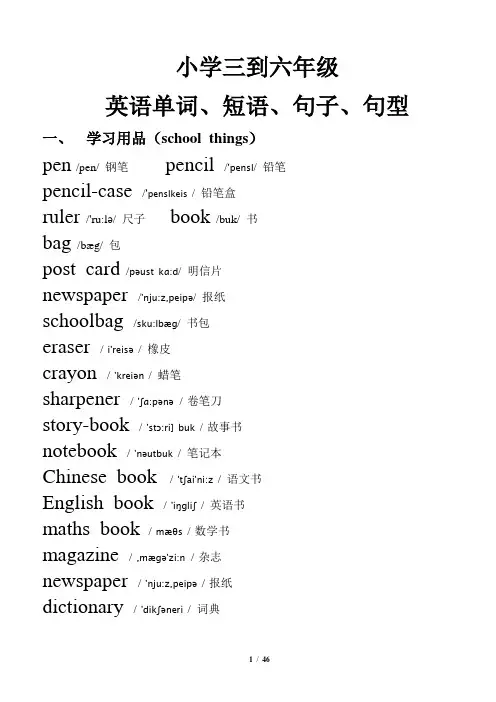
小学三到六年级英语单词、短语、句子、句型一、学习用品(school things)pen/pen/ 钢笔pencil /'pensl/铅笔pencil-case /'penslkeis / 铅笔盒ruler/'ru:lə/ 尺子book/buk/ 书bag/bæg/ 包post card/pəust kɑ:d/ 明信片newspaper /'nju:z,peipə/ 报纸schoolbag /sku:lbæg/ 书包eraser /i'reisə/ 橡皮crayon /'kreiən/ 蜡笔sharpener /'ʃɑ:pənə/卷笔刀story-book /'stɔ:ri] buk/故事书notebook /'nəutbuk/ 笔记本Chinese book /'tʃai'ni:z/ 语文书English book /'iŋgliʃ/ 英语书maths book/mæθs/数学书magazine /,mægə'zi:n/杂志newspaper /'nju:z,peipə/报纸dictionary /'dikʃəneri/ 词典二、身体部位(body)foot /fut/ 脚head /hed/头face /feis/脸hair /hɛə/ 头发nose /nəuz/鼻子mouth /mauθ/嘴eye /ai/眼睛ear /iə/耳朵arm / ɑ:m/手臂hand /hænd/手finger /'fiŋgə/ 手指leg /leg/腿tail /teil/尾巴三、颜色(colours)red /red/红blue /blu:/蓝yellow /'jeləu/黄green /gri:n/绿white /wait/白black /blæk/黑pink /piŋk/粉红purple /'pə:pl/ 紫orange /'ɔ:rindʒ/ 橙brown /braun/棕四、动物(animals)cat /kæt/猫dog /dɔg/狗pig /pig/猪duck /dʌk/鸭rabbit /'ræbit/兔子horse /hɔ:s/马elephant /'elifənt/ 大象ant/ænt/蚂蚁fish /fiʃ/鱼bird /bə:d/ 鸟snake /sneik/蛇mouse /maus/鼠kangaroo /,kæŋgə'ru:/ 袋鼠monkey/'mʌŋki/ 猴子panda /'pændə/ 熊猫bear /bɛə/熊 lion /'laiən/ 狮tiger /'taigə/老虎 fox/fɔks/狐狸zebra /'zi:brə/ 斑马deer/diə/鹿giraffe /dʒi'rɑ:f/ 长颈鹿goose /gu:s/鹅hen /hen/ 母鸡turkey /'tə:ki/ 火鸡lamb /læm/ 小羊sheep /ʃi:p/绵羊goat /gəut/ 山羊cow /kau/奶牛shark /'ʃɑ:k/鲨鱼seal /si:l/海豹五、人物(people)friend /frend/朋友boy /bɔi/男孩girl /gə:l/女孩mother /'mʌðə/ 母亲father /'fɑ:ðə/ 父亲 sister /'sistə/姐妹brother /'brʌðə/兄弟uncle /'ʌŋkl/叔叔man /mæn/男人woman/'wumən/女人Mr先生Miss小姐lady /'leidi/ 女士mom /mɔm/ 妈妈dad /dæd/爸爸parents /'pɛərənts/父母grandma /'grændmɑ:/ grandmother /'grænd,mʌðə/(外)祖母grandpa/'grændpɑ:/ grandfather /'grænd,fɑ:ðə/(外)祖父aunt /ɑ:nt/阿姨cousin /'kʌzn/ 堂兄妹son /sʌn/ 儿子baby /'beibi/婴儿kid/kid/小孩classmate/'klɑ:smeit/同学queen/'kwi:n/女visitor/'vizitə/参观者neighbour /'neibə/邻居principal /'prinsəpəl/校长pen pal /pen pæl/笔友tourist /'tu:rist/旅行者people /'pi:pl/人物robot /'rəubɔt/机器人六、职业(job)teacher /'ti:tʃə/ 教师student /'stju:dənt/学生doctor /'dɔktə/医生nurse /nə:s/ 护士driver /'draivə/司机farmer /'fɑ:mə/农民singer /'siŋə/歌唱家writer /'raitə/作家artist /'ɑ:tist/画家actor/'æktə/男演员actress/'æktris/女演员TV reporter /ri'pɔ:tə/ 电视台记者engineer /,endʒi'niə/工程师policeman /pə'li:smən/(男)警察salesperson /'seilz,pə:sn/销售员cleaner /'kli:nə/清洁工baseball player/'beis,bɔ:l'pleiə/棒球运动员assistant /ə'sistənt/售货员七、食品(food and drink:)breakfast /'brekfəst/早餐lunch /lʌntʃ/中餐dinner /'dinə/晚餐egg /eg/鸡蛋rice /rais/米饭cake /keik/蛋糕bread/bred/面包jam /dʒæm/果酱biscuit /'biskit/ 饼干sausage /'sɔ:sidʒ/香肠sandwich /'sændwitʃ/三明治dumplings /'dʌmpliŋ/饺子French fries/frentʃ fraiz/ 薯条meat /mi:t/肉chicken /'tʃikin/鸡肉mutton /'mʌtn/羊肉beef /bi:f/ 牛肉pork /pɔ:k/猪肉fish /fiʃ/鱼hamburger /'hæmbə:gə/汉堡hot dog /hɔt dɔg/热狗noodles /'nu:dl/面条soup /su:p/ 汤salad /'sæləd/沙拉milk /milk/牛奶water /'wɔ:tə/水ice-cream /ais kri:m/冰淇淋cola /'kəulə/ 可乐juice /dʒu:s/果汁tea /ti:/茶coffee /'kɔfi/咖啡fruit/fru:t/ 水果apple /'æpl /苹果banana /bə'nɑ:nə/香蕉pear /pɛə / 梨orange /'ɔ:rindʒ/橙watermelon /'wɔ:tə,melən/西瓜grape /greip / 葡萄cherry/'tʃeri /樱桃lemon/'lemən /柠檬mango/'mæŋgəu /芒果coconut/'kəukənʌt/椰子peach /pi:tʃ/桃strawberry /'strɔ:bəri /草莓vegetable/'vedʒitəbl/ 蔬菜eggplant / 'egplɑ:nt /茄子green beans /gri:n bi:ns /青豆tomato /tə'meitəu /西红柿potato / pə'teitəu / 土豆cucumber / 'kju:kəmbə/黄瓜onion /'ʌnjən/ 洋葱pea /pi:/豌豆carrot /'kærət/胡萝卜cabbage /'kæbidʒ/卷心菜pumpkin /'pʌmpkin/南瓜sweet potato/ swi:t pə'teitəu /红薯八、衣服(clothes)jacket/'dʒækit/ 夹克衫shirt/ʃə:t/ 衬衫T-shirt T恤衫skirt/skə:t/ 短裙子dress/dres/连衣裙jeans/dʒi:nz/牛仔裤pants /pænts//trousers /'trauzəz/裤子socks /sɔks/ 袜子shoes /ʃu:z/鞋子sweater/'swetə/ 毛衣 coat/kəut/ 外套raincoat /'reinkəut/ 雨衣shorts/ʃɔ:ts/ 短裤sandals/'sændl/凉鞋boots/bu:ts/靴子hat/hæt/ 有边帽cap/kæp/ 无边帽tie/tai/领带sunglasses/'sʌnglɑ:siz/太阳镜scarf/skɑ:f/ 围巾gloves/glʌvz/手套九、交通工具(vehicles)bike/baik/ 自行车bus/bʌs/ 公共汽车train/trein/ 火车boat/bəut/ 小船ship/ʃip/ 轮船yacht/jɔt/ 快艇car/kɑ:/小汽车taxi/'tæksi/出租车jeep/dʒi:p/ 吉普车van/væn/小货车plane/plein/飞机subway/'sʌbwei/地铁motor cycle /'məutə'saikl/ 摩托车十、杂物(other things)window/'windəu/ 窗户door/dɔ:/门desk/desk/ 课桌chair/tʃɛə/椅子bed/bed/ 床computer/kəm'pju:tə/计算机board /bɔ:d/ 写字板fan /fæn/风扇light /lait/ 灯mirror /'mirə/ 镜子teacher’s desk/'ti:tʃədesk/讲台picture/'piktʃə/图画photo/'fəutəu/ 照片wall /wɔ:l/ 墙壁floor /flɔ:/ 地板 football /'futbɔ:l/ 足球present /'preznt//gift /gift / 礼物walkman/ 'wɔ:kmən/随身听lamp/læmp/ 台灯phone/fəun/ 电话sofa/'səufə/沙发shelf/ʃelf/ 书架fridge/fridʒ/冰箱table/'teibl/桌子air-conditioner /ɛəkən'diʃənə/ 空调key /ki:/ 钥匙lock /lɔk/ 锁plate/pleit/ 盘子knife/naif/ 刀fork/fɔ:k/ 叉spoon/spu:n/ 勺子chopsticks /'tʃɔpstiks/ 筷子pot /pɔt/ 锅toy /tɔi/玩具doll /dɔl/ 洋娃娃ball /bɔ:l/球balloon/bə'lu:n/ 气球kite/kait/风筝jigsaw puzzle/'dʒigsɔ: 'pʌzl/拼图游戏box/bɔks/ 盒子umbrella/ʌm'brelə/伞zipper/'zipə/ 拉链 violin/,vaiə'lin/小提琴nest/nest/ 鸟窝hole/həul/洞toothbrush/'tu:θbrʌʃ/ 牙刷menu/'menju:/菜单e-card/kɑ:d/电子卡片e-mail/meil/电子邮件money/'mʌni/ 钱traffic light /'træfik lait/交通灯medicine /'medisin/药十一、地点(locations)home /həum/ 家room /ru:m/ 房间bedroom /'bedrum/卧室bathroom /'bæθrum/卫生间living room /'liviŋru:m/ 起居室/客厅kitchen /'kitʃin/厨房classroom /'klɑ:srum/ 教室school /sku:l/学校park /pɑ:k/公园library /'laibrəri/图书馆post office/pəust 'ɔ:fis/邮政局hospital /'hɔspitl/医院cinema /'sinimə/ 电影院bookstore /'bukstɔ:/书店farm /fɑ:m/ 农场zoo /zu:/动物园garden /'gɑ:dn/花园playground /'pleigraund/ 操场canteen /kæn'ti:n/餐厅teacher’s office/'ɔ:fis/ 教师办公室gym /dʒim/ 体育馆washroom /'wɔʃrum/盥洗室art room/ɑ:t ru:m/美术室computer room /kəm'pju:tə/ 电脑房music room /'mju:zik/ 音乐教室TV room电视房flat /flæt/ 公寓company /'kʌmpəni/公司factory /'fæktəri/工厂pet shop /petʃɔp/宠物店science museum/'saiəns mju:'ziəm/科学博物馆the Great Wall/greit wɔ:l/长城supermarket/'sju:pə,mɑ:kit/ 超市bank/bæŋk/银行country/'kʌntri/乡村village/'vilidʒ/ 村庄city/'siti/城市十二、气象(weather)cold/kəuld/冷的hot/hɔt/热的warm/wɔ:m/ 温暖的cool/ku:l/凉爽的snowy/snəui/下雪的sunny/'sʌni/晴朗的rainy/'reini/ 下雨windy/'windi/ 刮风的cloudy/'klaudi/ 多云的weather report/'weðəri'pɔ:t/天气预报十三、景物(nature)river/'rivə/ 河流lake/leik/湖泊stream/stri:m/ 小溪forest/'fɔrist/ 森林path/pɑ:θ/小路road/rəud/马路house/rəud/ 房子bridge/bridʒ/桥building/'bildiŋ/建筑物rain/rein/雨cloud/klaud/ 云sun/sʌn/ 太阳mountain/'mauntin/大山sky/skai/ 天空rainbow/'reinbəu/ 彩虹wind/waind/风air/ɛə/ 空气十四、植物(plants)flower/'flauə/ 花grass/grɑ:s/ 草tree/tri:/树seed/si:d/种子leaf/li:f/树叶plant/plɑ:nt/ 植物rose/rəuz/ 玫瑰十五、星期(week)Monday/'mʌndei/Tuesday/'tju:zdi/ Wednesday/wenzdi/ Thursday/'θə:zdi/ Friday /'fraidi/Saturday/'sætədi/ Sunday/'sʌndi/weekend/'wi:k'end/周末十六、月份(months)January/'dʒænjueri/ February/'februəri/ March /mɑ:tʃ/April /'eiprəl/ May /mei/June /dʒu:n/ July /dʒu:'lai/August /ɔ:'gʌst/ September /sep'tembə/October /ɔk'təubə/November/nəu'vembə/ December /di'sembə/十七、季节(seasons)spring /spriŋ/ summer /'sʌmə/fall/autumn/fɔ:l'ɔ:təm/ winter/'wintə/十八、方位(directions)south/sauθ/南 north/nɔ:θ/北 east/i:st/东west/west/西 left/left/左right/rait/右十九、患病(illness)have a fever /'fi:və/ 发高烧hurt /hə:t/疼痛have a cold/kəuld/伤风have a toothache /'tu:θei/牙疼have a headache /'hedeik/头疼have a sore throat/sɔ: θrəut/喉咙疼have a stomachache/'stʌməkeik/胃痛二十、数词(number)one two three four fivesix seven eight nine ten eleven twelve thirteen fourteen fifteen sixteen seventeen eighteen nineteen twenty二十 thirty三十 forty四十fifty五十 sixty六十seventy七十eighty八十 ninety九十hundred /'hʌndrəd/ 一百first第一second第二third第三fourth第四fifth第五sixth第六seventh第七eighth第八ninth第九tenth 第十eleventh 第十一twelfth第十二二十一、形容词(adj.)big /big/大的small/smɔ:/小的long/lɔŋ/长的tall/tɔ:l/高的short/ʃɔ:t/短的young/jʌŋ/年轻的old/əuld/老的strong/strɔŋ/强壮的thin/θin/瘦的active/'æktiv/积极的quiet/'kwaiət/安静的nice/nais /好的kind/kaind/善良的strict/strikt/严格的smart/smɑ:t/聪明的funny/'fʌni/滑稽的sweet/swi:t/甜的salty/'sɔ:lti/咸的sour/'sauə/酸的fresh/freʃ/新鲜favourite/'feivəri t/最喜欢的clean/kli:n/干净的tired/'taiəd/累的excited/ik'saitid/兴奋的angry/'æŋgri/生气的happy/'hæpi/高兴的bored/bɔ:d/无聊的sad/sæd/难过的taller更高的shorter更短的stronger更强壮的older更老的younger更年轻的bigger更大的heavier更重的longer 更长的thinner更瘦的smaller更小的good好的better更好的higher更高的fine/fain/好的great/greit/棒的heavy/'hevi/重的new/nju:/新的fat/fæt/胖的right/rait/对的hungry/'hʌŋgri/饿的cute/kju:t/可爱的little/'litl/小的lovely/'lʌvli/可爱的beautiful/'bju:təfəl/漂亮的colourful/'kʌləful/五颜六色的pretty/'priti/漂亮的cheap/tʃi:p/便宜的expensive/iks'pensiv/贵的juicy/'dʒu:si/有汁的 healthy/'helθi/健康的helpful/'helpfəl/有帮助的high/hai/高的easy/'i:zi/简单的proud/praud/骄傲的二十二、介词(prep.)in在……里面on 在……上面under/'ʌndə/在……下面near/niə/在……附近behind/bi'haind/在……后面next to 在……旁边over/'əuvə/悬在……上面in front of/frʌnt/在……前面二十三、代词(pron.)I/ai/我we/wi:/我们you/ju:/你,你们he/hi:/他she/ʃi:/她it/it/它they/ðei/他们my/mai/我的our/'auə/我们的your/juə/你的,你们的his/hiz/他的her/hə:/她的二十四、动词(verb.)play/plei/玩swim/swim/游泳skate/skeit/溜冰fly/flai/飞jump/dʒʌmp/跳walk/wɔ:k/走run/rʌn/跑climb/klaim/爬fight/fait/打架swing/swiŋ/荡秋千eat/i:t/吃sleep/sli:p/睡觉like/laik/喜欢have/hæv/有buy/bai/买take/teik/拍(照),带live/liv/居住teach/ti:tʃ/教go/gəu/去study/'stʌdi/学习learn/lə:n/学习sing/siŋ/唱歌dance/dɑ:ns/跳舞row/rəu/划read books读书do homework做作业watch TV /wɔtʃ/ 看电视cook the meals /kuk mi:l/ 烧菜water the flowers /'flauə/浇花sweep the floor /swi:p flɔ:/拖地clean the bedroom /kli:n'bedrum/打扫房间make the bed铺床叠被set the table /'teibl/摆餐桌wash the clothes/wɔʃkləuðz/洗衣服wash the dishes /diʃ/洗盘子use a computer /kəm'pju:tə/用电脑do morning exercises /'mɔ:niŋ'eksəsaiz/做早操eat breakfast /i:t'brekfəst/吃早餐eat dinner /'dinə/吃晚饭go to school去上学have English class上英语课play sports/plei spɔ:ts/体育运动get up起床climb mountains/klaim'mauntins/爬山go shopping去购物play the piano /pi'ænəu/ 弹钢琴visit grandparents/'vizit 'grænd,pɛərənt/拜访祖父母go hiking /haik/ 去远足fly kites /flai kaits/ 放风筝make a snowman/meikə'snəu,mæn/堆雪人plant trees /plɑ:nt tri:z/ 植树draw pictures /drɔ: 'piktʃəz/画画cook dinner /kuk'dinə/烧晚饭read a book 读书answer the phone/'ɑ:nsəfəun/接电话listen to music /'lisn 'mju:zik/听音乐clean the room打扫房间write a letter /rait'letə/ 写信write an e-mail写电子邮件drink water /driŋk'wɔ:tə/ 喝水take pictures/teik'piktʃə/ 拍照片pick up leaves /pikʌp li:vz/ 摘树叶write a report /rait ri'pɔ:t/ 写报告play chess /tʃes/ 下棋have a picnic /'piknik/ 野餐get to到达ride a bike /raid baik/ 骑自行车play the violin /,vaiə'lin/ 拉小提琴collect stamps /kə'lekt stæmp/ 集邮meet/mi:t/ 遇见 welcome/'welkəm/ 欢迎thank /θæŋk/ 谢谢work /wə:k/ 工作drink /driŋk/ 喝taste /teist/ 尝smell /smel/ 闻feed /fi:d/ 喂milk /milk/ 挤牛奶look /luk/ 看guess /ges/ 猜help /help/ 帮助pass/pɑ:s/ 传递show/ʃəu/展示,给……看use /ju:z/ 用clean /kli:n/ 打扫open/'əupən/ 打开close /kləuz/ 关put /put/ 放read /ri:d/ 读,看write /rait/ 写paint /peint/ 画画tell /tel/ 告诉kick /kik/ 踢ride /raid/ 骑stop /stɔp/ 停wait /weit/ 等find /faind/ 找drive /draiv/ 驾驶fold /fəuld/ 折叠send /send/送,寄wash /wɔʃ/ 洗shine/ʃain/照耀become/bi'kʌm/变成feel /fi:l/ 感觉think /θiŋk/ 想fall /fɔ:l/ 掉下leave /li:v/ 离开wake up/weikʌp/醒过来put on穿上take off 脱下hang up /hæŋʌp/ 挂起来wear /wɛə/ 穿go home回家go to bed去睡觉play computer games/kəm'pju:təgeims/玩电脑游戏play chess /tʃes/ 下棋do housework /'hauswə:k/ 做家务empty the trash/'empti træʃ/倒垃圾put away the clothes /kləuð/放好衣服get off下车 take a trip/trip/去郊游read a magazine /,mægə'zi:n/读杂志go to the cinema /'sinimə/去电影院二十五、疑问词what什么what colour什么颜色what time几点what day星期几how怎样how old年龄多大、几岁how many多少how much 多少钱how tall多高how heavy多重how long多长how big多大how large/hau lɑ:dʒ/面积多大who/hu:/谁when/h wen/什么时候whose/hu:z/谁的where/h wɛə/在哪里why/hwai/为什么which /h witʃ/ 哪一个1. English teacher2. math teacher3. Chinese teacher英语老师数学老师语文老师4. have an English class5. on Wednesdays6. do my homework上一节英语课在星期三做作业7.watch TV 8. read books 9. play computer games看电视看书玩计算机游戏10. my favourite 11. favourite fruit 12. sweep the floor我最爱的最喜欢的水果扫地13. cook the meals 14. clean the room 15. water the flowers做饭清洁房间浇花16. wash the clothes 17. set the table 18. make the bed洗衣服摆餐具铺床19. do the dishes 20. clean the bedroom 21. use a computer洗碗碟清洁卧室用计算机22. near the table 23. under the bed 24. over the river桌子旁边床下河上方25. on the desk 26. behind the door 27. in the closet书桌上门后面衣橱里28. a picture of my room一张我房间的照片1. do morning exercises2. eat breakfast3. eat dinner晨练吃早饭吃晚饭4. fly kites5. get up6. go hiking放风筝起床去远足7. climb mountains 8. climb trees 9. go shopping爬山爬树购物10. have English class 11. make a snowman 12. plant trees上英语课堆雪人种树13. play sports 14. play the piano 15. visit grandparents进行体育运动弹钢琴看望祖父母16. draw pictures 17. cook dinner 18. read a book画画做饭看书19. answer the phone 20. listen to music 21. clean the room接电话听音乐打扫房间22. write a letter 23. write an e-mail 24. drink water写信写电子邮件喝水25. watch insects 26. take pictures 27. pick up leaves观察昆虫照相采摘树叶28. do an experiment 29. catch butterflies 30. count insects做实验捉蝴蝶数昆虫31. collect leaves收集树叶32. write a report写报告33. play chess 下棋34. have a picnic举行野餐1.on foot 走路2.by train 坐火车3. by bus坐公共汽车4. by bike 骑自行车5.by plane坐飞机6. stop at a red right 红灯停7.wait at a yellow light 黄灯等8. go at a green light 绿灯走9. traffic light交通灯10. near the post office 邮局附近11. next to the hospital医院隔壁(与医院相邻)12. turn left 转左13. turn right 转右14. go straight 直走15. get on 上车16. get off 下车17.take a trip 去旅行18. read a magazine看杂志19. go to the cinema 看电影20 . this morning 今天早上21. this afternoon 今天下午22. this evening 今天晚上23. next week下周24. collect stamps 集邮25. make kites 制作风筝26. ride a bike 骑自行车27. play the violin 拉小提琴28. go to work 上班29. watch TV at night 晚上看电视30. read newspapers 看报纸31. teach English教英语32. live in Beijing 住在北京33. come from 来自34. plant flower seeds 种花种1.taller than…比……高2.have a fever 发烧3. have a cold 感冒4.have a toothache 牙疼5. have a headache 头疼6. have a sore throat 喉咙疼7. watch TV 看电视8. wash clothes 洗衣服9. play football 踢足球10. visit grandparents 看望祖父母11. go to a park 去公园12. read a book 看书13. go swimming 去游泳14. go fishing 去钓鱼15. went hiking 去远足16. learn Chinese 学习汉语17. sing and dance 唱歌跳舞18. eat good food 吃美食19. take pictures 照相20. buy presents 买礼物21. row a boat 划船22. see elephant 看大象23. go skiing 去滑雪24. go ice-skating 去滑冰1.This is my computer. 这是我的计算机。
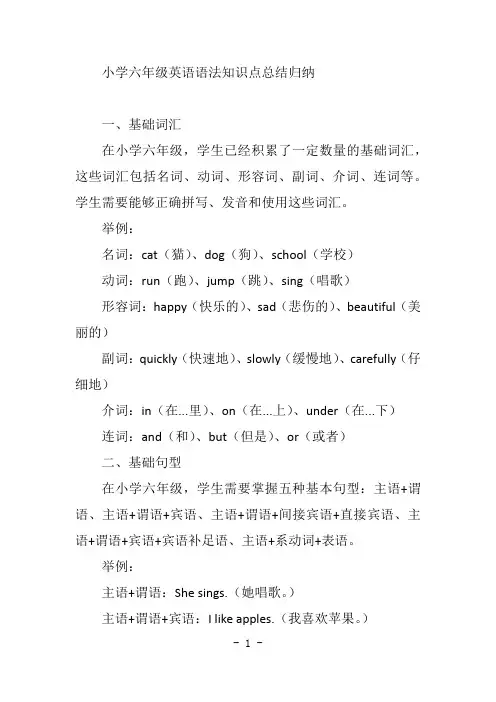
小学六年级英语语法知识点总结归纳一、基础词汇在小学六年级,学生已经积累了一定数量的基础词汇,这些词汇包括名词、动词、形容词、副词、介词、连词等。
学生需要能够正确拼写、发音和使用这些词汇。
举例:名词:cat(猫)、dog(狗)、school(学校)动词:run(跑)、jump(跳)、sing(唱歌)形容词:happy(快乐的)、sad(悲伤的)、beautiful(美丽的)副词:quickly(快速地)、slowly(缓慢地)、carefully(仔细地)介词:in(在...里)、on(在...上)、under(在...下)连词:and(和)、but(但是)、or(或者)二、基础句型在小学六年级,学生需要掌握五种基本句型:主语+谓语、主语+谓语+宾语、主语+谓语+间接宾语+直接宾语、主语+谓语+宾语+宾语补足语、主语+系动词+表语。
举例:主语+谓语:She sings.(她唱歌。
)主语+谓语+宾语:I like apples.(我喜欢苹果。
)主语+谓语+间接宾语+直接宾语:My mother gave me a book.(我妈妈给了我一本书。
)主语+谓语+宾语+宾语补足语:They elected him their monitor.(他们选他为班长。
)主语+系动词+表语:She is happy.(她很高兴。
)三、时态在小学六年级,学生需要掌握一般现在时、现在进行时、一般过去时和一般将来时这四种时态的基本用法。
举例:一般现在时:She always goes to school on time.(她总是按时上学。
)现在进行时:She is studying now.(她现在正在学习。
)一般过去时:Yesterday, we visited the zoo.(昨天,我们参观了动物园。
)一般将来时:I will go to the park tomorrow.(我明天将去公园。
)四、动词的基本形式学生需要了解动词的基本形式,包括原形、第三人称单数形式、现在分词、过去式和过去分词。
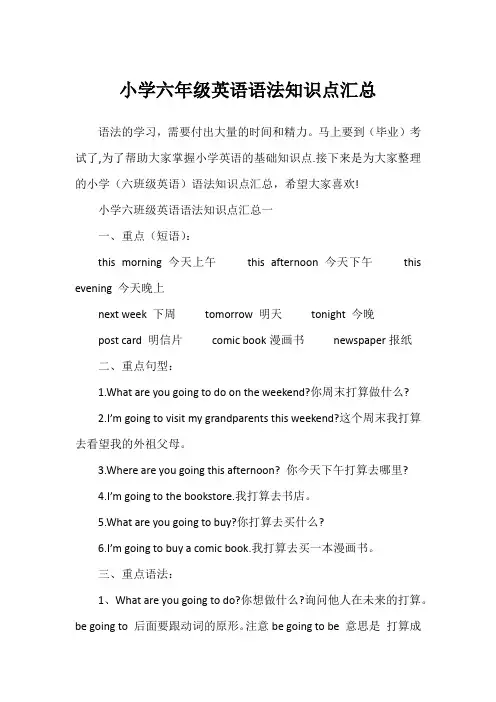
小学六年级英语语法知识点汇总语法的学习,需要付出大量的时间和精力。
马上要到(毕业)考试了,为了帮助大家掌握小学英语的基础知识点.接下来是为大家整理的小学(六班级英语)语法知识点汇总,希望大家喜欢!小学六班级英语语法知识点汇总一一、重点(短语):this morning 今天上午this afternoon 今天下午this evening 今天晚上next week 下周tomorrow 明天tonight 今晚post card 明信片comic book漫画书newspaper报纸二、重点句型:1.What are you going to do on the weekend?你周末打算做什么?2.I’m going to visit my grandparents this weekend?这个周末我打算去看望我的外祖父母。
3.Where are you going this afternoon? 你今天下午打算去哪里?4.I’m going to the bookstore.我打算去书店。
5.What are you going to buy?你打算去买什么?6.I’m going to buy a comic book.我打算去买一本漫画书。
三、重点语法:1、What are you going to do?你想做什么?询问他人在未来的打算。
be going to 后面要跟动词的原形。
注意be going to be 意思是打算成为什么,干什么职业。
注意一下(句子)的区别,找出正确回答。
What are you going to do this afternoon?What are you going to buy?What are you going to be?When? are you going?Where are you going?How are you going?Who are you going with?2、this evening 和tonight的区别:this evening指的是今天晚上睡觉以前的时间,一般指晚上十二点以前。
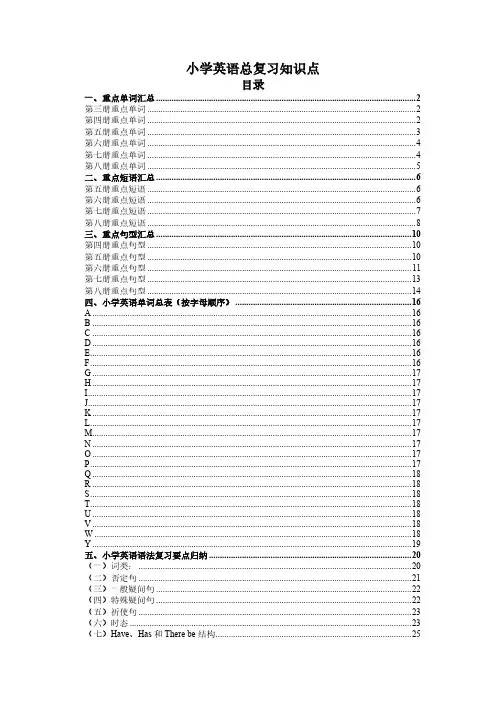
小学英语总复习知识点目录一、重点单词汇总 (2)第三册重点单词 (2)第四册重点单词 (2)第五册重点单词 (3)第六册重点单词 (4)第七册重点单词 (4)第八册重点单词 (5)二、重点短语汇总 (6)第五册重点短语 (6)第六册重点短语 (6)第七册重点短语 (7)第八册重点短语 (8)三、重点句型汇总 (10)第四册重点句型 (10)第五册重点句型 (10)第六册重点句型 (11)第七册重点句型 (13)第八册重点句型 (14)四、小学英语单词总表(按字母顺序) (16)A (16)B (16)C (16)D (16)E (16)F (16)G (17)H (17)I (17)J (17)K (17)L (17)M (17)N (17)O (17)P (17)Q (18)R (18)S (18)T (18)U (18)V (18)W (18)Y (19)五、小学英语语法复习要点归纳 (20)(一)词类: (20)(二)否定句 (21)(三)一般疑问句 (22)(四)特殊疑问句 (22)(五)祈使句 (23)(六)时态 (23)(七)Have、Has和There be结构 (25)一、重点单词汇总第三册重点单词bag 包bed床beef 牛肉book 书boy 男孩bread 面包brother 兄弟chair 椅子chicken 鸡肉classroom教室desk 课桌doctor 医生friend 朋友girl 女孩home家milk 牛奶mother妈妈pen 钢笔pencil铅笔pencil-case铅笔盒rice米饭room 房间ruler 尺子school 学校sister 姐妹student 学生teacher 教师water 水window 窗户nurse 护士fish 鱼第四册重点单词computer 计算机board 写字板fan 风扇light 灯this 这个is 是my 我的that 那个your 你的teacher’s des讲台picture 图画wall 墙壁floor 地板yes 是的it 它one 一two 二three 三four 四five五six六seven 七eight八nine 九ten 十what 什么time 时间it’s 它是o’clock…点钟math 数学Chinese 语文English 英语P.E. 体育music 音乐for 为;给class 课程red 红色的blue 蓝色的yellow 黄色的green 绿色的white 白色的no 不;不是not 不是的skirt 短裙shirt 衬衫jacket 夹克衫T-shirt T恤衫dress 连衣裙colour 颜色warm 暖和的cold 寒冷的cool 凉爽的today今天jeans 牛仔裤pants 长裤socks 袜子shoes 鞋子let’s 让我们play 玩;踢football 足球snowy下雪的sunny 晴朗的how much 多少钱big 大的small 小的long 长的short 短的apple 苹果banana 香蕉pear 梨orange 橙子watermelon 西瓜are 是(复数) they 它(他,她)们horse 马aren’t 不是(复数) cat 猫rabbit 兔子pig 猪duck 鸭子dog 狗eleven 十一twelve 十二thirteen 十三fifteen 十五twenty 二十how many多少there 那儿;那里第五册重点单词smart 聪明的old 年老的thin 瘦的funny 滑稽可笑的tall 高的active活跃的but 但是quiet 安静;文静的very 很;非常young 年轻的strong 强壮的kind和蔼亲切的Mr. 先生short 矮的like 像;喜欢strict严格的who’s=who is是谁what’s=what is是什么he’s=he is他是she’s=she is她是Monday星期一Tuesday 星期二Wednesday星期三Thursday星期四Friday 星期五Saturday星期六Sunday 星期天day 天;日子have 有;吃on在……时候too 太;也grape 葡萄don’t=do not不要ruit 水果salty咸的fresh 新鲜的favourite最喜爱的tasty 好吃的fish 鱼茄子sour 酸的we 我们lunch午饭;中餐tomato 西红柿potato 土豆tofu 豆腐green beans青豆they’re=they are 他(她;它)们是curtain窗帘trash bin 垃圾桶closet 衣橱mirror 镜子end table 床头柜bedroom卧室kitchen 厨房bathroom 卫生间living room 客厅in 在…里on 在…上under 在…下near在…附近behind 在…后面clothes 衣服river 河流flower 花grass 草lake 湖泊forest 森林path 小路park 公园house房子bridge 桥tree 树木road 路;公路building 建筑物clean 干净的eggplant 茄子sweet 甜的第六册重点单词Apr.四月at 在……点钟Aug. 八月because 因为best 最;极birthday 生日date日期Dec. 十二月evening夜晚;晚上fall 秋天Feb. 二月fly 飞grandpa爷爷;外公her 她的Jan. 一月July 七月June 六月May 五月Mar. 三月Mom 妈妈noon 中午Nov. 十一月Oct. 十月often 经常season 季节Sept. 九月skate 滑冰sleep 睡觉sometimes有时候spring 春天summer 夏天swim 游泳uncle 叔叔usually 通常;一般why 为什么weekend周末which 哪一个winter 冬天honey 蜂蜜study 书房jump 跳run 跑kangaroo 袋鼠climb 往上爬fight 打架swing 荡;荡秋千第七册重点单词by经;乘… foot脚bike 自行车bus 公共汽车train 火车how 怎样traffic交通stop停;停车站wait等;等待library 图书馆post office 邮局hospital 医院cinema 电影院bookstore 书店where 哪里please 请turn转弯right 右边left 左边straight 成直线地then然后comic book 漫画书post card 明信片newspaper报纸buy购买hobby爱好dive 跳水live 居住teach教go 去watch 观看read 读;看does 助动词doesn’t否定助动词singer 歌唱家writer作家actor 男演员actress 女演员artist 画家TV reporter电视台记者engineer 工程师accountant 会计policeman 警察salesperson 销售员cleaner 清洁工work 工作rain 雨;下雨cloud 云;云彩sun 太阳stream 小溪;小河seed 种子soil 泥土sprout 苗;嫩芽plant 植物;种植should 应该then 然后第八册重点单词taller 更高的shorter 更矮的stronger 更强壮的older 年纪更大的younger更年轻的bigger更大的heavier 更重的longer更长的thinner更瘦的smaller 更小的hurt疼痛:受伤matter事情sore 疼的nose 鼻子tired 疲劳的excited 兴奋的angry 生气的happy高兴的bored 无聊的sad 伤心的last上一个;最后的weekend 周末to 向:朝park 公园Chinese 汉语;中国的good 好的present礼物boat 小船elephant大象how 怎样;多么watch-watched观看wash-washed洗clean-cleaned 打扫play-played玩visit-visited看望;拜访;参观do-did做go-went 去read-read 读:阅读learn-learned 学习dance- danced跳舞eat-ate吃take-took 照;拍climb-climbed 爬have-had 有buy-bought 买row-rowed 划see-saw看见leave-left 离开get-got 到达二、重点短语汇总第五册重点短语1. English teacher 2. math teacher英语老师数学老师3. Chinese teacher4. have an English class语文老师上一节英语课5. on Wednesdays6. do my homework在星期三做作业7.watch TV 8. read books看电视看书9. play computer games 10. my favourite玩计算机游戏我最爱的11. favourite fruit 12. sweep the floor最喜欢的水果扫地13. cook the meals 14. clean the room做饭清洁房间15. water the flowers 16. wash the clothes浇花洗衣服17. set the table 18. make the bed摆餐具铺床19. do the dishes 20. clean the bedroom洗碗碟清洁卧室21. use a computer 22. near the table用计算机桌子旁边23. under the bed 24. over the river床下河上方25. on the desk 26. behind the door书桌上门后面27. in the closet 28. a picture of my room衣橱里一张我房间的照片第六册重点短语1. do morning exercises 2. eat breakfast晨练吃早饭3. eat dinner4. fly kites吃晚饭放风筝5. get up6. go hiking起床去远足7. climb mountains 8. climb trees爬山爬树9. go shopping 10. have English class购物上英语课11. make a snowman 12. plant trees堆雪人种树13. play sports 14. play the piano进行体育运动弹钢琴15. visit grandparents 16. draw pictures看望祖父母画画17. cook dinner 18. read a book做饭看书19. answer the phone 20. listen to music接电话听音乐21. clean the room 22. write a letter打扫房间写信23. write an e-mail 24. drink water写电子邮件喝水25. watch insects 26. take pictures观察昆虫照相27. pick up leaves 28. do an experiment采摘树叶做实验29. catch butterflies 30. count insects捉蝴蝶数昆虫31. collect leaves收集树叶32. write a report写报告33. play chess 下棋34. have a picnic举行野餐第七册重点短语1.on foot 走路 2. by train 坐火车3. by bus4. by bike坐公共汽车骑自行车5.by plane6. stop at a red right坐飞机红灯停7.wait at a yellow light 8. go at a green light黄灯等绿灯走9. traffic light 10. near the post office交通灯邮局附近11. next to the hospital 12. turn left医院隔壁(与医院相邻)转左13. turn right 14. go straight转右直走15. get on 16. get off上车下车17.take a trip 18. read a magazine去旅行看杂志19. go to the cinema 20 . this morning看电影今天早上21. this afternoon 22. this evening今天下午今天晚上23. next week 24. collect stamps下周集邮25. make kites 26. ride a bike制作风筝骑自行车27. play the violin 拉小提琴28. go to work 上班29. watch TV at night 30. read newspapers晚上看电视看报纸31. teach English 32. live in Beijing教英语住在北京33. come from 34. plant flower seeds来自种花种第八册重点短语1.taller than…比……高2. have a fever 发烧3.have a cold 感冒4. have a toothache 牙疼5. have a headache 头疼6. have a sore throat 喉咙疼7. watch TV 看电视8. wash clothes 洗衣服9. play football 踢足球10. visit grandparents 看望祖父母11. go to a park 去公园12. read a book 看书7. go swimming 去游泳8. go fishing 去钓鱼9. went hiking 去远足10. learn Chinese 学习汉语11. sing and dance 唱歌跳舞12.eat good food 吃美食13.take pictures 照相14. buy presents 买礼物14.row a boat 划船16. see elephant 看大象15.go skiing 去滑雪18. go ice-skating 去滑冰三、重点句型汇总第四册重点句型1.This is my computer. 这是我的计算机。
![小学英语知识点[语法,句型,词汇]](https://uimg.taocdn.com/6e0e5bf82cc58bd63186bda0.webp)
第一部分:语法知识(词类)一.名词:名词单复数,名词的格式(一)名词单复数1.一般情况,直接加-s,如:book-books, bag-bags, cat-cats, bed-beds2.以s. x. sh. ch结尾,加-es,如:bus-buses, box-boxes, brush-brushes, watch-watches3.以“辅音字母+y”结尾,变y为i, 再加-es,如:family-families, strawberry-strawberries4.以“f或fe”结尾,变f或fe为v, 再加-es,如:knife-knives5.不规则名词复数:man-men, woman-women, policeman-policemen, policewoman-policewomen,mouse-mice,child-children, foot-feet, tooth-teeth, fish-fish, people-people, Chinese-Chinese, Japanese-Japanese不可数名词的复数就是原型:paper, juice, water, milk, rice, tea(二)名词的格(1) 有生命的东西的名词所有格:a) 单数后加’s 如: Lucy’s ruler my father’s shirtb) 以s 结尾的复数名词后加’如: his friends’ bagsc) 不以s 结尾的复数后加’s children’s shoesd)并列名词中,如果把’s加在最后一个名词后,表示共有, 如:Tom and Mike’s car 汤姆和迈克共有的小汽车要表示所有物不是共有的,应分别在并列名词后加’sTom’s and Mike’s cars 汤姆和麦克各自的小汽车(2)表示无生命东西的名词通常用“ of +名词”来表示所有关系:如:a picture of the classroom a map of China二.冠词:不定冠词,定冠词1.种类:(1)不定冠词:a / an a unit / an uncle元音开头的可数名词前用an :an egg / an apple / an orange / an eraser / an answer / an ID card / an alarm clock / an actor / an actress / an e-mail / an address / an event / an example / an opera / an houran old man / an interesting book / an exciting sport / an action movie / an art lesson /(2)定冠词:the the egg the plane2. 用法:定冠词的用法:(1)特指某(些)人或某(些)物:The ruler is on the desk.(2)复述上文提到的人或物:He has a sweater. The sweater is new.(3)谈话双方都知道的人或物:The boys aren’t at school.(4)在序数词前:John’s birthday is February the second.(5)用于固定词组中:in the morning / afternoon / evening不用冠词的情况:(1)专有名词前:China is a big country.(2)名词前有定语:this , that , my , your , some, any , no 等:This is my baseball.(3)复数名词表示一类人和事:Monkeys can’t swim. They are teachers.(4)在节日,日期,月份,季节前:Today is Christmas Day. It’s Sunday.(5)一日三餐前:We have breakfast at 6:30.(6)球类棋类运动前:They often play football after class. He plays chess at home(7)学科名称前:My favorite subject is music.(8)在称呼或头衔的名词前:This is Mr Li.(9)固定词组中:at noon at night by bus三、代词、形容词、副词1.代词:人称代词(主格,宾格),物主代词第一人称单数I(我)me my(我的)复数we(我们)us our(我们的)第二人称单数you(你)you your(你的)复数you(你们)you your(你们的)第三人称单数he(他)him his(他的)she(她)her her(她的)it(它)it its(它的)复数they(他们/她们/它们)them their(他们的/她们的/它们的)2.形容词,副词:比较级,最高级(一)形容词的比较级1、形容词比较级在句子中的运用:两个事物或人的比较用比较级,比较级后面一般带有单词than。
小学英语总复习重点单词、短语、句型、语法总汇第三册重点单词1.bag 包bed床beef 牛肉2.book 书boy 男孩bread 面包3.brother 兄弟chair 椅子chicken 鸡肉4.classroom教室desk 课桌doctor 医生5.friend 朋友girl 女孩home家k 牛奶mother妈妈pen 钢笔7.pencil铅笔pencil-case铅笔盒rice米饭8.room 房间ruler 尺子school 学校9.sister 姐妹student 学生teacher 教师10.water 水window 窗户nurse 护士11.fish 鱼第四册重点单词puter 计算机board 写字板fan 风扇2.light 灯this 这个is 是3.my 我的that 那个your 你的4.teacher’s des讲台picture 图画wall 墙壁5.floor 地板yes 是的it 它6.one 一two 二three 三7.four 四five五six六8.seven 七eight八nine 九9.ten 十what 什么time 时间10.it’s 它是o’clock…点钟math 数学11.Chinese 语文English 英语P.E. 体育12.music 音乐for 为;给class 课程13.red 红色的blue 蓝色的yellow 黄色的14.green 绿色的white 白色的no 不;不是15.not 不是的skirt 短裙shirt 衬衫16.jacket 夹克衫T-shirt T恤衫dress 连衣裙17.colour 颜色warm 暖和的cold 寒冷的18.cool 凉爽的today今天jeans 牛仔裤19.pants 长裤socks 袜子shoes 鞋子20.let’s 让我们play 玩;踢football 足球21.snowy下雪的sunny 晴朗的how much 多少钱22.big 大的small 小的long 长的23.short 短的apple 苹果banana 香蕉24.pear 梨orange 橙子watermelon 西瓜25.are 是(复数) they 它(他,她)们horse 马26.aren’t 不是(复数) cat 猫rabbit 兔子27.pig 猪duck 鸭子dog 狗28.eleven 十一twelve 十二thirteen 十三29.fifteen 十五twenty 二十how many多少30.there 那儿;那里第五册重点单词1.smart 聪明的old 年老的thin 瘦的2.funny 滑稽可笑的tall 高的active活跃的3.but 但是quiet 安静;文静的very 很;非常4. young 年轻的strong 强壮的kind和蔼亲切的5. Mr. 先生short 矮的like 像;喜欢6. strict严格的who’s=who is是谁what’s=what is是什么7. he’s=he is他是she’s=she is她是Monday星期一8. Tuesday 星期二Wednesday星期三Thursday星期四9. Friday 星期五Saturday星期六Sunday 星期天10. day 天;日子have 有;吃on在……时候11. too 太;也grape 葡萄don’t=do not不要12.fruit 水果salty咸的fresh 新鲜的13.favourite最喜爱的tasty 好吃的fish 鱼茄子14.sour 酸的we 我们lunch午饭;中餐15.tomato 西红柿potato 土豆tofu 豆腐16.green beans青豆they’re=they are 他(她;它)们是17.curtain窗帘trash bin 垃圾桶closet 衣橱18.mirror 镜子end table 床头柜bedroom卧室19.kitchen 厨房bathroom 卫生间living room 客厅20. in 在…里on 在…上under 在…下21. near在…附近behind 在…后面clothes 衣服22. river 河流flower 花grass 草23. lake 湖泊forest 森林path 小路24. park 公园house房子bridge 桥25. tree 树木road 路;公路building 建筑物26. clean 干净的eggplant 茄子sweet 甜的第五册重点短语1. English teacher2. math teacher英语老师数学老师3. Chinese teacher4. have an English class语文老师上一节英语课5. on Wednesdays6. do my homework在星期三做作业7.watch TV 8. read books看电视看书9. play computer games 10. my favourite玩计算机游戏我最爱的11. favourite fruit 12. sweep the floor最喜欢的水果扫地13. cook the meals 14. clean the room做饭清洁房间15. water the flowers 16. wash the clothes浇花洗衣服17. set the table 18. make the bed摆餐具铺床19. do the dishes 20. clean the bedroom洗碗碟清洁卧室21. use a computer 22. near the table用计算机桌子旁边23. under the bed 24. over the river床下河上方25. on the desk 26. behind the door书桌上门后面27. in the closet 28. a picture of my room衣橱里一张我房间的照片第六册重点单词1. Apr.四月at 在……点钟Aug. 八月2. because 因为best 最;极birthday 生日3. date日期Dec. 十二月evening夜晚;晚上4. fall 秋天Feb. 二月fly 飞5. grandpa爷爷;外公her 她的Jan. 一月6. July 七月June 六月May 五月7. Mar. 三月Mom 妈妈noon 中午8. Nov. 十一月Oct. 十月often 经常9. season 季节Sept. 九月skate 滑冰10. sleep 睡觉sometimes有时候spring 春天11. summer 夏天swim 游泳uncle 叔叔12. usually 通常;一般why 为什么weekend周末13. which 哪一个winter 冬天honey 蜂蜜14. study 书房jump 跳run 跑15. kangaroo 袋鼠climb 往上爬fight 打架16. swing 荡;荡秋千第六册重点短语1. do morning exercises2. eat breakfast晨练吃早饭3. eat dinner4. fly kites吃晚饭放风筝5. get up6. go hiking起床去远足7. climb mountains 8. climb trees爬山爬树9. go shopping 10. have English class购物上英语课11. make a snowman 12. plant trees堆雪人种树13. play sports 14. play the piano进行体育运动弹钢琴15. visit grandparents 16. draw pictures看望祖父母画画17. cook dinner 18. read a book做饭看书19. answer the phone 20. listen to music接电话听音乐21. clean the room 22. write a letter打扫房间写信23. write an e-mail 24. drink water写电子邮件喝水25. watch insects 26. take pictures观察昆虫照相27. pick up leaves 28. do an experiment采摘树叶做实验29. catch butterflies 30. count insects捉蝴蝶数昆虫31. collect leaves收集树叶32. write a report写报告33. play chess 下棋34. have a picnic举行野餐第七册重点单词1.by经;乘… foot脚bike 自行车2.bus 公共汽车train 火车how 怎样3.traffic交通stop停;停车站wait等;等待4.library 图书馆post office 邮局hospital 医院5.cinema 电影院bookstore 书店where 哪里6.please 请turn转弯right 右边7.left 左边straight 成直线地then然后ic book 漫画书post card 明信片newspaper报纸9.buy购买hobby爱好dive 跳水10.live 居住teach教go 去11.watch 观看read 读;看does 助动词12.doesn’t否定助动词singer 歌唱家writer作家13.actor 男演员actress 女演员artist 画家 reporter电视台记者engineer 工程师15.accountant 会计policeman 警察16.salesperson 销售员cleaner 清洁工17.work 工作rain 雨;下雨cloud 云;云彩18.sun 太阳stream 小溪;小河seed 种子19.soil 泥土sprout 苗;嫩芽plant 植物;种植20.should 应该then 然后第七册重点短语1.on foot 走路2. by train 坐火车3. by bus4. by bike坐公共汽车骑自行车5.by plane6. stop at a red right坐飞机红灯停7.wait at a yellow light 8. go at a green light黄灯等绿灯走9. traffic light 10. near the post office交通灯邮局附近11. next to the hospital 12. turn left医院隔壁(与医院相邻)转左13. turn right 14. go straight转右直走15. get on 16. get off上车下车17.take a trip 18. read a magazine去旅行看杂志19. go to the cinema 20 . this morning看电影今天早上21. this afternoon 22. this evening今天下午今天晚上23. next week 24. collect stamps下周集邮25. make kites 26. ride a bike制作风筝骑自行车27. play the violin 拉小提琴28. go to work 上班29. watch TV at night 30. read newspapers晚上看电视看报纸31. teach English 32. live in Beijing教英语住在北京33. come from 34. plant flower seeds来自种花种第八册重点单词:1.taller 更高的shorter 更矮的stronger 更强壮的2.older 年纪更大的younger更年轻的bigger更大的3.heavier 更重的longer更长的thinner更瘦的4.smaller 更小的hurt疼痛:受伤matter事情5.sore 疼的nose 鼻子tired 疲劳的6.excited 兴奋的angry 生气的happy高兴的7.bored 无聊的sad 伤心的last上一个;最后的8.weekend 周末to 向:朝park 公园9.Chinese 汉语;中国的good 好的present礼物10.boat 小船elephant大象how 怎样;多么11.watch-watched观看wash-washed洗12.clean-cleaned 打扫play-played玩13.visit-visited看望;拜访;参观do-did做14.go-went 去read-read 读:阅读15.learn-learned 学习dance- danced跳舞16.eat-ate吃take-took 照;拍17.climb-climbed 爬have-had 有18.buy-bought 买row-rowed 划19.see-saw看见leave-left 离开20.get-got 到达第八册重点短语1.taller t han…比……高2. have a fever 发烧2.have a cold 感冒 4. have a toothache 牙疼5. have a headache 头疼6. have a sore throat 喉咙疼7. watch TV 看电视8. wash clothes 洗衣服9. play football 踢足球10. visit grandparents 看望祖父母11. go to a park 去公园12. read a book 看书7. go swimming 去游泳8. go fishing 去钓鱼9. went hiking 去远足10. learn Chinese 学习汉语11. sing and dance 唱歌跳舞12.eat good food 吃美食1.take pictures 照相14. buy presents 买礼物2.row a boat 划船16. see elephant 看大象3.go skiing 去滑雪18. go ice-skating 去滑冰第四册重点句型1.This is my computer. 这是我的计算机。
(完整版)小学英语语法总结全集小学英语语法总结全集小学英语语法汇总(一)可数名词与别可数名词“分家”一、可数名词与别可数名词的区不一般名词所表示的人或事物是能够按个数计算的,这类名词叫可数名词。
可数名词分为个体名词(表示某类人或事物中的个体,如worker, farmer, desk, fact ory等)和集体名词(表示作为一具整体来看的一群人或一些事物,如people,fa mily 等)。
假如一般名词所表示的事物是别能按个数来计算的,这类名词就叫别可数名词。
别可数名词分为物质名词(表示无法分为个体的物质,如meat, rice, water, milk, orange 等)和抽象名词(表示动作、状态、事情、品质等抽象概念,如work, homework, time, health, friendship等)。
二、可数名词的家务事可数名词有单数和复数两种形式。
指一具人或一件事物时,用单数形式;指两个或多个人或事物时用复数形式。
名词由单数形式变成复数形式的规则如下: 1. 普通的名词词尾直截了当加-s 。
如:book → books room → roomshouse → houses day → days2. 以s,ss, ch,sh, x 结尾的名词,在词尾加-es 。
如:bus → buses glass → glasseswatch → watchesdish → dishes box → boxes3. 以"辅音字母+y"结尾的名词,要先将y改为i再加-es。
如:city → cities body → bodiesfactory → factories等等。
4. 以f 或fe 结尾的名词,要将f或fe改为v再加-es。
如:half → halves leaf → leavesknife → knives wife → wives5. 特例[悄悄话:特例常常考,要记住。
句型语法一、一般现在时一般现在时基本用法介绍【No. 1】一般现在时的功能1.表示事物或人物的特征、状态。
如:The sky is blue.天空是蓝色的。
2.表示经常性或习惯性的动作。
如:I get up at six every day.我每天六点起床。
3.表示客观现实。
如:The earth goes around the sun.地球绕着太阳转。
一般现在时的构成1. be动词:主语+be(am,is,are)+其它。
如: I am a boy.我是一个男孩。
2.行为动词:主语+行为动词(+其它)。
如: We study English.我们学习英语。
当主语为第三人称单数(he, she,it)时,要在动词后加"-s"或"-es"。
如:Mary likes Chinese.玛丽喜欢汉语。
一般现在时的变化1. be动词的变化。
否定句:主语+ be + not +其它。
如:He is not a worker.他不是工人。
一般疑问句:Be +主语+其它。
如:-Are you a student?-Yes. I am. / No, I'm not.特殊疑问句:疑问词+一般疑问句。
如:Where is my bike?2.行为动词的变化。
否定句:主语+ don't( doesn't ) +动词原形(+其它)。
如: I don't like bread.当主语为第三人称单数时,要用doesn't构成否定句。
如:He doesn't often play.一般疑问句:Do( Does ) +主语+动词原形+其它。
如:- Do you often play football?- Yes, I do. / No, I don't.当主语为第三人称单数时,要用does构成一般疑问句。
如:- Does she go to work by bike?- Yes, she does. / No, she doesn't.特殊疑问句:疑问词+一般疑问句。
⼩学英语总复习单词短语句型语法总汇⼩学英语总复习重点单词、短语、句型、语法总汇第三册重点单词1.bag 包bed床beef ⽜⾁2.book 书boy 男孩bread ⾯包3.brother 兄弟chair 椅⼦chicken 鸡⾁4.classroom教室desk 课桌doctor 医⽣5.friend 朋友girl ⼥孩home家k ⽜奶mother妈妈pen 钢笔7.pencil铅笔pencil-case铅笔盒rice⽶饭8.room 房间ruler 尺⼦school 学校9.sister 姐妹student 学⽣teacher 教师10.water ⽔window 窗户nurse 护⼠11.fish 鱼第四册重点单词puter 计算机board 写字板fan 风扇2.light 灯this 这个is 是3.my 我的that 那个your 你的4.teacher’s des讲台picture 图画wall 墙壁5.floor 地板yes 是的it 它6.one ⼀two ⼆three 三7.four 四five五six六8.seven 七eight⼋nine 九9.ten ⼗what 什么time 时间10.it’s 它是o’clock…点钟math 数学11.Chinese 语⽂English 英语P.E. 体育12.music ⾳乐for 为;给class 课程13.red 红⾊的blue 蓝⾊的yellow 黄⾊的14.green 绿⾊的white ⽩⾊的no 不;不是15.not 不是的skirt 短裙shirt 衬衫16.jacket 夹克衫T-shirt T恤衫dress 连⾐裙17.colour 颜⾊warm 暖和的cold 寒冷的18.cool 凉爽的today今天jeans ⽜仔裤19.pants 长裤socks 袜⼦shoes 鞋⼦20.let’s 让我们play 玩;踢football ⾜球21.snowy下雪的sunny 晴朗的how much 多少钱22.big ⼤的small ⼩的long 长的23.short 短的apple 苹果banana ⾹蕉24.pear 梨orange 橙⼦watermelon 西⽠25.are 是(复数) they 它(他,她)们horse 马26.aren’t 不是(复数) cat 猫rabbit 兔⼦27.pig 猪duck 鸭⼦dog 狗28.eleven ⼗⼀twelve ⼗⼆thirteen ⼗三29.fifteen ⼗五twenty ⼆⼗how many多少30.there 那⼉;那⾥第五册重点单词1.smart 聪明的old 年⽼的thin 瘦的2.funny 滑稽可笑的tall ⾼的active活跃的3.but 但是quiet 安静;⽂静的very 很;⾮常4. young 年轻的strong 强壮的kind和蔼亲切的5. Mr. 先⽣short 矮的like 像;喜欢6. strict严格的who’s=who is是谁what’s=what is是什么7. he’s=he is他是she’s=she is她是Monday星期⼀8. Tuesday 星期⼆Wednesday星期三Thursday星期四9. Friday 星期五Saturday星期六Sunday 星期天10. day 天;⽇⼦have 有;吃on在……时候11. too 太;也grape 葡萄don’t=do not不要12.fruit ⽔果salty咸的fresh 新鲜的13.favourite最喜爱的tasty 好吃的fish 鱼茄⼦14.sour 酸的we 我们lunch午饭;中餐15.tomato 西红柿potato ⼟⾖tofu ⾖腐16.green beans青⾖they’re=they are 他(她;它)们是17.curtain窗帘trash bin 垃圾桶closet ⾐橱18.mirror 镜⼦end table 床头柜bedroom卧室19.kitchen 厨房bathroom 卫⽣间living room 客厅20. in 在…⾥on 在…上under 在…下21. near在…附近behind 在…后⾯clothes ⾐服22. river 河流flower 花grass 草23. lake 湖泊forest 森林path ⼩路24. park 公园house房⼦bridge 桥25. tree 树⽊road 路;公路building 建筑物26. clean ⼲净的eggplant 茄⼦sweet 甜的第五册重点短语1. English teacher2. math teacher英语⽼师数学⽼师3. Chinese teacher4. have an English class语⽂⽼师上⼀节英语课5. on Wednesdays6. do my homework在星期三做作业7.watch TV 8. read books看电视看书9. play computer games 10. my favourite 玩计算机游戏我最爱的11. favourite fruit 12. sweep the floor最喜欢的⽔果扫地13. cook the meals 14. clean the room做饭清洁房间15. water the flowers 16. wash the clothes 浇花洗⾐服17. set the table 18. make the bed摆餐具铺床19. do the dishes 20. clean the bedroom 洗碗碟清洁卧室21. use a computer 22. near the table⽤计算机桌⼦旁边23. under the bed 24. over the river床下河上⽅25. on the desk 26. behind the door书桌上门后⾯27. in the closet 28. a picture of my room ⾐橱⾥⼀张我房间的照⽚第六册重点单词1. Apr.四⽉at 在……点钟Aug. ⼋⽉2. because 因为best 最;极birthday ⽣⽇3. date⽇期Dec. ⼗⼆⽉evening夜晚;晚上4. fall 秋天Feb. ⼆⽉fly 飞5. grandpa爷爷;外公her 她的Jan. ⼀⽉6. July 七⽉June 六⽉May 五⽉7. Mar. 三⽉Mom 妈妈noon 中午8. Nov. ⼗⼀⽉Oct. ⼗⽉often 经常9. season 季节Sept. 九⽉skate 滑冰10. sleep 睡觉sometimes有时候spring 春天11. summer 夏天swim 游泳uncle 叔叔12. usually 通常;⼀般why 为什么weekend周末13. which 哪⼀个winter 冬天honey 蜂蜜14. study 书房jump 跳run 跑15. kangaroo 袋⿏climb 往上爬fight 打架16. swing 荡;荡秋千第六册重点短语1. do morning exercises2. eat breakfast晨练吃早饭3. eat dinner4. fly kites吃晚饭放风筝5. get up6. go hiking起床去远⾜7. climb mountains 8. climb trees爬⼭爬树9. go shopping 10. have English class购物上英语课11. make a snowman 12. plant trees堆雪⼈种树13. play sports 14. play the piano进⾏体育运动弹钢琴15. visit grandparents 16. draw pictures看望祖⽗母画画17. cook dinner 18. read a book做饭看书19. answer the phone 20. listen to music接电话听⾳乐21. clean the room 22. write a letter打扫房间写信23. write an e-mail 24. drink water写电⼦邮件喝⽔25. watch insects 26. take pictures观察昆⾍照相27. pick up leaves 28. do an experiment采摘树叶做实验29. catch butterflies 30. count insects捉蝴蝶数昆⾍31. collect leaves收集树叶32. write a report写报告33. play chess 下棋34. have a picnic举⾏野餐第七册重点单词1.by经;乘… foot脚bike ⾃⾏车2.bus 公共汽车train ⽕车how 怎样3.traffic交通stop停;停车站wait等;等待4.library 图书馆post office 邮局hospital 医院5.cinema 电影院bookstore 书店where 哪⾥6.please 请turn转弯right 右边7.left 左边straight 成直线地then然后ic book 漫画书post card 明信⽚newspaper报纸9.buy购买hobby爱好dive 跳⽔10.live 居住teach教go 去11.watch 观看read 读;看does 助动词12.doesn’t否定助动词singer 歌唱家writer作家13.actor 男演员actress ⼥演员artist 画家 reporter电视台记者engineer ⼯程师15.accountant 会计policeman 警察16.salesperson 销售员cleaner 清洁⼯17.work ⼯作rain ⾬;下⾬cloud 云;云彩18.sun 太阳stream ⼩溪;⼩河seed 种⼦19.soil 泥⼟sprout 苗;嫩芽plant 植物;种植20.should 应该then 然后第七册重点短语1.on foot ⾛路2. by train 坐⽕车3. by bus4. by bike坐公共汽车骑⾃⾏车5.by plane6. stop at a red right坐飞机红灯停7.wait at a yellow light 8. go at a green light黄灯等绿灯⾛9. traffic light 10. near the post office交通灯邮局附近11. next to the hospital 12. turn left医院隔壁(与医院相邻)转左13. turn right 14. go straight转右直⾛15. get on 16. get off上车下车17.take a trip 18. read a magazine去旅⾏看杂志19. go to the cinema 20 . this morning看电影今天早上21. this afternoon 22. this evening今天下午今天晚上23. next week 24. collect stamps下周集邮25. make kites 26. ride a bike制作风筝骑⾃⾏车27. play the violin 拉⼩提琴28. go to work 上班29. watch TV at night 30. read newspapers晚上看电视看报纸31. teach English 32. live in Beijing教英语住在北京33. come from 34. plant flower seeds来⾃种花种第⼋册重点单词:1.taller 更⾼的shorter 更矮的stronger 更强壮的2.older 年纪更⼤的younger更年轻的bigger更⼤的3.heavier 更重的longer更长的thinner更瘦的4.smaller 更⼩的hurt疼痛:受伤matter事情5.sore 疼的nose ⿐⼦tired 疲劳的6.excited 兴奋的angry ⽣⽓的happy⾼兴的7.bored ⽆聊的sad 伤⼼的last上⼀个;最后的8.weekend 周末to 向:朝park 公园9.Chinese 汉语;中国的good 好的present礼物10.boat ⼩船elephant⼤象how 怎样;多么11.watch-watched观看wash-washed洗12.clean-cleaned 打扫play-played玩13.visit-visited看望;拜访;参观do-did做14.go-went 去read-read 读:阅读15.learn-learned 学习dance- danced跳舞16.eat-ate吃take-took 照;拍17.climb-climbed 爬have-had 有18.buy-bought 买row-rowed 划19.see-saw看见leave-left 离开20.get-got 到达第⼋册重点短语1.taller than…⽐……⾼2. have a fever 发烧2.have a cold 感冒 4. have a toothache ⽛疼5. have a headache 头疼6. have a sore throat 喉咙疼7. watch TV 看电视8. wash clothes 洗⾐服9. play football 踢⾜球10. visit grandparents 看望祖⽗母11. go to a park 去公园12. read a book 看书7. go swimming 去游泳8. go fishing 去钓鱼9. went hiking 去远⾜10. learn Chinese 学习汉语11. sing and dance 唱歌跳舞12.eat good food 吃美⾷1.take pictures 照相14. buy presents 买礼物2.row a boat 划船16. see elephant 看⼤象3.go skiing 去滑雪18. go ice-skating 去滑冰第四册重点句型1.This is my computer. 这是我的计算机。
小学英语语法总结一、时态小结凡是在must, mustn’t,can, can’t,let’s, don't, may,will后的一定要用动词的原形二、名词的复数。
名词按其数,可分两种:可数名词和不可数名词。
可数名词的复数变化规则:1。
一般情况下,直接在词尾加-s,如:girl—girls, book-books, pen-pens2。
以s,x,sh,ch结尾的词,在词后加-es, 如:class—classes, box—boxes, match—matches,3. 以辅音字母+y结尾的,变y 为i 再加-es,如:city—cities, family—families, country— countries 4。
以f或fe结尾的,变f或fe为v再加-es,如:knife—knives, wife—wives, life—lives,5。
以o 结尾的加—es或—s, 如: radio-radios, tomato—tomatoes, potato—potatoes, zoo—zoos,photo-photos,6。
man—men, woman-women, foot—feet, child-children,三、形容词的比较级、最高级。
形容词有比较级与最高级之分,单音节词的变化规则:1。
一般情况下,直接在词尾加-er或—est, 如:small-smaller—smallest, short—shorter—shortest2. 以e结尾的,加-er或-est,如:large—larger—largest, nice—nicer—nicest。
3.以辅音字母+y结尾的,变y 为i 再加—er或-est, 如:busy—busier—busiest, heavy—heavier-heaviest。
4。
以重读闭音节,一个辅音字母结尾的,双写该字母,再加—er或—est,如:big—bigger—biggest,thin-thinner-thinnest。
1:“first”是序数词,与“the”相连,解释为第一。
2:像“first,term,world”作为词组出现时前面要加“the”。
3:“all”所有;后面的可数名词用复数形式,be动词用“are”。
4:“any”一些;用在否定句和一般疑问句中,与“some”同义。
“some”用在肯定句中。
5:there be+数词,采用“就近原则”。
6:a map of China 与 a map of the world 要牢记。
7:要用“on the wall”,不能用“in the wall”。
门、窗在墙上才能用“in the wall”。
8:can 后+动词原形。
9:play+the+乐器; play+球类;10:like的用法11:动词变动名词形式方法:A--直接在动词后面+ing形式(大多数)。
B--以不发音的“e”结尾的,要去掉e后再+ing,比如:dancing,making,riding。
C--重读be音节,末尾只有一个辅音,须双写末尾的字母后再+ing,如:running,swimmi ng,sitting,putting。
12:现在进行时的构成:be动词+动词ing形式。
标志:now、look、listen、its time to。
13:现在进行时的一般疑问句 /问--be动词+人称+时态(动词ing)答--Yes,he/She/it is/am/are. No,he/She/it isnt/arent/am not.14:用Are you...? Yes,I am/ we are. No,Im not/We arent.15: 动词后+人称宾格形式.16:一般现在时的构成:第三人称单数(三单)。
要注意:后面的动词+s或es。
特例:have→has do→dose go→goes; 标志:often,usually。
17:有些名词变动词时要变形式,例如:teacher→teach;driver→drive.1.一般现在时一般现在时态中,动词一般用原形。
小学英语总复习重点单词、短语、句型、语法总汇第三册重点单词1.bag 包bed床beef 牛肉2.book 书boy 男孩bread 面包3.brother 兄弟chair 椅子chicken 鸡肉4.classroom教室desk 课桌doctor 医生5.friend 朋友girl 女孩home家k 牛奶mother妈妈pen 钢笔7.pencil铅笔pencil-case铅笔盒rice米饭8.room 房间ruler 尺子school 学校9.sister 姐妹student 学生teacher 教师10.water 水window 窗户nurse 护士11.fish 鱼第四册重点单词puter 计算机board 写字板fan 风扇2.light 灯this 这个is 是3.my 我的that 那个your 你的4.teacher’s des讲台picture 图画wall 墙壁5.floor 地板yes 是的it 它6.one 一two 二three 三7.four 四five五six六8.seven 七eight八nine 九9.ten 十what 什么time 时间10.it’s 它是o’clock…点钟math 数学11.Chinese 语文English 英语P.E. 体育12.music 音乐for 为;给class 课程13.red 红色的blue 蓝色的yellow 黄色的14.green 绿色的white 白色的no 不;不是15.not 不是的skirt 短裙shirt 衬衫16.jacket 夹克衫T-shirt T恤衫dress 连衣裙17.colour 颜色warm 暖和的cold 寒冷的18.cool 凉爽的today今天jeans 牛仔裤19.pants 长裤socks 袜子shoes 鞋子20.let’s 让我们play 玩;踢football 足球21.snowy下雪的sunny 晴朗的how much 多少钱22.big 大的small 小的long 长的23.short 短的apple 苹果banana 香蕉24.pear 梨orange 橙子watermelon 西瓜25.are 是(复数) they 它(他,她)们horse 马26.aren’t 不是(复数) cat 猫rabbit 兔子27.pig 猪duck 鸭子dog 狗28.eleven 十一twelve 十二thirteen 十三29.fifteen 十五twenty 二十how many多少30.there 那儿;那里第五册重点单词1.smart 聪明的old 年老的thin 瘦的2.funny 滑稽可笑的tall 高的active活跃的3.but 但是quiet 安静;文静的very 很;非常4. young 年轻的strong 强壮的kind和蔼亲切的5. Mr. 先生short 矮的like 像;喜欢6. strict严格的who’s=who is是谁what’s=what is是什么7. he’s=he is他是she’s=she is她是Monday星期一8. Tuesday 星期二Wednesday星期三Thursday星期四9. Friday 星期五Saturday星期六Sunday 星期天10. day 天;日子have 有;吃on在……时候11. too 太;也grape 葡萄don’t=do not不要12.fruit 水果salty咸的fresh 新鲜的13.favourite最喜爱的tasty 好吃的fish 鱼茄子14.sour 酸的we 我们lunch午饭;中餐15.tomato 西红柿potato 土豆tofu 豆腐16.green beans青豆they’re=they are 他(她;它)们是17.curtain窗帘trash bin 垃圾桶closet 衣橱18.mirror 镜子end table 床头柜bedroom卧室19.kitchen 厨房bathroom 卫生间living room 客厅20. in 在…里on 在…上under 在…下21. near在…附近behind 在…后面clothes 衣服22. river 河流flower 花grass 草23. lake 湖泊forest 森林path 小路24. park 公园house房子bridge 桥25. tree 树木road 路;公路building 建筑物26. clean 干净的eggplant 茄子sweet 甜的第五册重点短语1. English teacher2. math teacher英语老师数学老师3. Chinese teacher4. have an English class语文老师上一节英语课5. on Wednesdays6. do my homework在星期三做作业7.watch TV 8. read books看电视看书9. play computer games 10. my favourite玩计算机游戏我最爱的11. favourite fruit 12. sweep the floor最喜欢的水果扫地13. cook the meals 14. clean the room做饭清洁房间15. water the flowers 16. wash the clothes浇花洗衣服17. set the table 18. make the bed摆餐具铺床19. do the dishes 20. clean the bedroom洗碗碟清洁卧室21. use a computer 22. near the table用计算机桌子旁边23. under the bed 24. over the river床下河上方25. on the desk 26. behind the door书桌上门后面27. in the closet 28. a picture of my room衣橱里一张我房间的照片第六册重点单词1. Apr.四月at 在……点钟Aug. 八月2. because 因为best 最;极birthday 生日3. date日期Dec. 十二月evening夜晚;晚上4. fall 秋天Feb. 二月fly 飞5. grandpa爷爷;外公her 她的Jan. 一月6. July 七月June 六月May 五月7. Mar. 三月Mom 妈妈noon 中午8. Nov. 十一月Oct. 十月often 经常9. season 季节Sept. 九月skate 滑冰10. sleep 睡觉sometimes有时候spring 春天11. summer 夏天swim 游泳uncle 叔叔12. usually 通常;一般why 为什么weekend周末13. which 哪一个winter 冬天honey 蜂蜜14. study 书房jump 跳run 跑15. kangaroo 袋鼠climb 往上爬fight 打架16. swing 荡;荡秋千第六册重点短语1. do morning exercises2. eat breakfast晨练吃早饭3. eat dinner4. fly kites吃晚饭放风筝5. get up6. go hiking起床去远足7. climb mountains 8. climb trees爬山爬树9. go shopping 10. have English class购物上英语课11. make a snowman 12. plant trees堆雪人种树13. play sports 14. play the piano进行体育运动弹钢琴15. visit grandparents 16. draw pictures看望祖父母画画17. cook dinner 18. read a book做饭看书19. answer the phone 20. listen to music接电话听音乐21. clean the room 22. write a letter打扫房间写信23. write an e-mail 24. drink water写电子邮件喝水25. watch insects 26. take pictures观察昆虫照相27. pick up leaves 28. do an experiment采摘树叶做实验29. catch butterflies 30. count insects捉蝴蝶数昆虫31. collect leaves收集树叶32. write a report写报告33. play chess 下棋34. have a picnic举行野餐第七册重点单词1.by经;乘… foot脚bike 自行车2.bus 公共汽车train 火车how 怎样3.traffic交通stop停;停车站wait等;等待4.library 图书馆post office 邮局hospital 医院5.cinema 电影院bookstore 书店where 哪里6.please 请turn转弯right 右边7.left 左边straight 成直线地then然后ic book 漫画书post card 明信片newspaper报纸9.buy购买hobby爱好dive 跳水10.live 居住teach教go 去11.watch 观看read 读;看does 助动词12.doesn’t否定助动词singer 歌唱家writer作家13.actor 男演员actress 女演员artist 画家 reporter电视台记者engineer 工程师15.accountant 会计policeman 警察16.salesperson 销售员cleaner 清洁工17.work 工作rain 雨;下雨cloud 云;云彩18.sun 太阳stream 小溪;小河seed 种子19.soil 泥土sprout 苗;嫩芽plant 植物;种植20.should 应该then 然后第七册重点短语1.on foot 走路2. by train 坐火车3. by bus4. by bike坐公共汽车骑自行车5.by plane6. stop at a red right坐飞机红灯停7.wait at a yellow light 8. go at a green light黄灯等绿灯走9. traffic light 10. near the post office交通灯邮局附近11. next to the hospital 12. turn left医院隔壁(与医院相邻)转左13. turn right 14. go straight转右直走15. get on 16. get off上车下车17.take a trip 18. read a magazine去旅行看杂志19. go to the cinema 20 . this morning看电影今天早上21. this afternoon 22. this evening今天下午今天晚上23. next week 24. collect stamps下周集邮25. make kites 26. ride a bike制作风筝骑自行车27. play the violin 拉小提琴28. go to work 上班29. watch TV at night 30. read newspapers晚上看电视看报纸31. teach English 32. live in Beijing教英语住在北京33. come from 34. plant flower seeds来自种花种第八册重点单词:1.taller 更高的shorter 更矮的stronger 更强壮的2.older 年纪更大的younger更年轻的bigger更大的3.heavier 更重的longer更长的thinner更瘦的4.smaller 更小的hurt疼痛:受伤matter事情5.sore 疼的nose 鼻子tired 疲劳的6.excited 兴奋的angry 生气的happy高兴的7.bored 无聊的sad 伤心的last上一个;最后的8.weekend 周末to 向:朝park 公园9.Chinese 汉语;中国的good 好的present礼物10.boat 小船elephant大象how 怎样;多么11.watch-watched观看wash-washed洗12.clean-cleaned 打扫play-played玩13.visit-visited看望;拜访;参观do-did做14.go-went 去read-read 读:阅读15.learn-learned 学习dance- danced跳舞16.eat-ate吃take-took 照;拍17.climb-climbed 爬have-had 有18.buy-bought 买row-rowed 划19.see-saw看见leave-left 离开20.get-got 到达第八册重点短语1.taller t han…比……高2. have a fever 发烧2.have a cold 感冒 4. have a toothache 牙疼5. have a headache 头疼6. have a sore throat 喉咙疼7. watch TV 看电视8. wash clothes 洗衣服9. play football 踢足球10. visit grandparents 看望祖父母11. go to a park 去公园12. read a book 看书7. go swimming 去游泳8. go fishing 去钓鱼9. went hiking 去远足10. learn Chinese 学习汉语11. sing and dance 唱歌跳舞12.eat good food 吃美食1.take pictures 照相14. buy presents 买礼物2.row a boat 划船16. see elephant 看大象3.go skiing 去滑雪18. go ice-skating 去滑冰第四册重点句型1.This is my computer. 这是我的计算机。